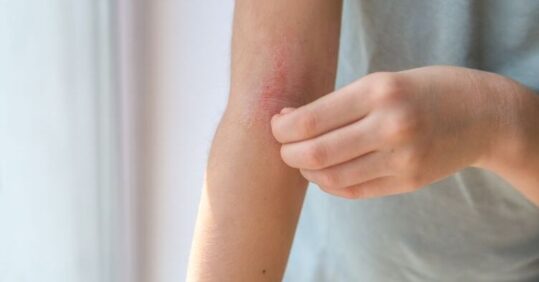Mythbuster: ‘Everyone with eczema should be tested for allergy’

In the latest in our series dispelling common healthcare myths, GP Dr Toni Hazell explains why most patients with eczema don’t need allergy testing – and should avoid having the tests if possible
Eczema is common – it affects up to 30% of children and 10% of adults.1 It is an atopic (allergic) condition, associated with other atopic conditions such as asthma, hay fever and food allergy. So it seems logical to think that everyone with eczema should have allergy tests, so that they can avoid allergens which might cause their eczema to flare. However, this is actually a common myth – one that is important to ‘bust’, as it has the potential to lead to significant overdiagnosis and unnecessary dietary or other restrictions.
What does allergy testing usually involve?
When we talk about allergy tests in primary care, we usually mean a specific immunoglobulin (Ig)E (sIgE) test. IgE is a type of antibody, a part of the immune system that recognises and reacts to threats to the body’s health, such as bacteria and viruses. In allergy, a specific IgE against a food, or against a harmless substance such as pollen, reacts as if that substance was a threat. The body releases histamine which causes an allergic reaction such as a rash, swelling or wheeze. The sIgE can then be detected in the blood, even if the sample isn’t taken during an allergic reaction.
Related Article: Diagnosis Connect service will link people to advice from charities
IgE mediated allergic reactions tend to happen quickly, usually within minutes of exposure. They present with features that most people would understand as being allergic, such as a rash, swelling or wheeze, which can be treated with an antihistamine, or in more serious circumstances with an adrenaline auto-injector (colloquially known as an Epi-pen, although other brands are available) and steroids. If a person has a history consistent with an IgE mediated allergy, for example that whenever they eat strawberries their mouth swells up, or that eating dairy makes them wheeze, then the clinical diagnosis of allergy has already been made; an sIgE test is likely to be positive and that will reinforce the diagnosis. If a person with eczema gives such a history, then it would be reasonable to request an allergy test for the specific substance.
Inappropriate sIgE testing
However, a more common request in primary care is for ‘allergy tests’ for a patient who has eczema but has no clear history of an allergic reaction occurring rapidly after a certain food is eaten. The request is often for a battery of tests to things like milk and wheat, in the hope that cutting them out of the diet might improve the eczema. This isn’t good clinical practice, and NICE is clear that the majority of people with eczema don’t need allergy tests.2
If a host of sIgE tests are requested, in a scattergun fashion, it is very possible that one or more of them will be positive. For example, a patient has a positive sIgE to strawberries, but eats them regularly with no problem. This means the patient is sensitised to strawberries – at some point, their immune system has developed sIgE towards strawberries – but they have no symptoms of allergy. This is clinically unimportant, and they don’t need to stop eating strawberries. Of course, strawberries aren’t a mainstay of anyone’s diet, but it is easy to see how a positive sIgE to an important nutrient such as wheat or milk, in the absence of allergy, could cause unnecessary dietary restriction and potential deficiencies, if interpreted incorrectly.
Another reason for an allergy test to be requested is because a patient has tried cutting something out of their diet and has noticed that their eczema has tended to improve, again without any history of a rapid allergic reaction to that substance. This may be an indication of a non-IgE mediated allergy.3 These present with symptoms which are not always so clearly allergic, and which develop slowly – hours or even days after exposure to the allergen. Symptoms can include abdominal pain, nausea and vomiting, blood in the stools, reflux and flares of eczema. Because this reaction is not related to a specific IgE, there is no point in doing an sIgE test.
Related Article: CVD prevention must be national health priority, says report
Investigating non-IgE mediated allergy
The only way to work out whether a non-IgE mediated allergy is contributing to eczema is to strictly remove the suspected substance from the diet for at least six weeks. If the eczema appears to be better, it’s important to then reintroduce the substance and look for the eczema to worsen again.4 This might seem counter-intuitive – if you can see that cutting out dairy makes your skin better, why would you want to start eating it again? However, it is important in order to reduce overdiagnosis. Eczema can vary in severity over time, and it is possible that symptoms may have coincidentally improved at the point where an allergen was cut out of the diet. If you don’t demonstrate a worsening when that substance is re-introduced, any resulting dietary restriction might be unnecessary.
In summary, patients with eczema who request allergy tests should be treated in the same way as anyone who requests allergy tests. Take a good history, and if there is a clear history of an immediate allergic reaction to a specific substance, it’s reasonable to check an sIgE test to that substance. If there’s a feeling that a substance might make the eczema worse over time, but no clear reaction, advise a six-week exclusion diet, followed by reintroduction. And if there’s no clear history of any worsening of eczema with a food or other substance then you can clearly explain that allergy tests aren’t indicated – and advise against buying tests online;5 these usually test for IgG, which is irrelevant to allergy, NICE advises against them,6 and their only effect is to lighten the wallet.
Dr Toni Hazell is a GP in north London
Related Article: Postnatal contraception advice reduces the risk of back-to-back pregnancies
References
- NICE. CKS. Eczema – atopic: How common is it? Last revised May 2024
- NICE. CKS. Eczema – atopic: Identifying trigger factors. Last revised May 2024
- Papapostolou N, Xepapadaki P, Gregoriou S et al. Atopic dermatitis and food allergy: A complex interplay. What we know and what we would like to learn. J Clin Med 2022;11(14):4232
- British Society for Allergy and Clinical Immunology (BSACI). Skin allergy: Eczema management.
- British Dietetic Association. Home allergy testing kits – more harm than good? March 2022
- NICE. Food allergy in under 19s: assessment and diagnosis. [CG116] February 2011

See how our symptom tool can help you make better sense of patient presentations
Click here to search a symptom




